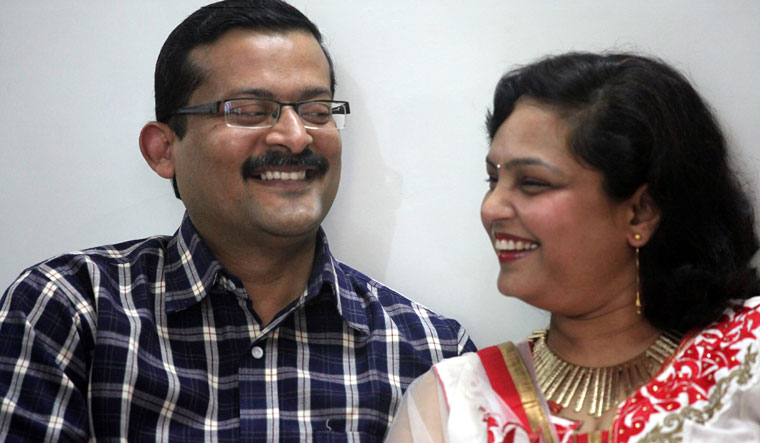Shrinkhala Gupta’s intent to marry Fahad Hydar was drowned by her father’s protests. This despite Hydar’s parents having no objection to their son converting to Hinduism for the nuptials. “My father’s discomfort with Muslims is something we grew up with,” said Lucknow-based Shrinkhala, whose Muslim wedding in 2003 took place without her parents’ approval. For the wedding, Shrinkhala was given a new name: Shireen. “To me, it was a name given out of love by my in-laws,” she said. “I saw no reason to oppose it. Taking my husband’s surname was also not a big deal.”
Last week, the state government introduced the Uttar Pradesh Prohibition of Unlawful Conversion of Religion Ordinance, which aims to prohibit “unlawful conversion from one religion to another by… fraudulent means or by marriage and for the matters connected therewith or incidental thereto”. Although the ordinance brings into its ambit all religious converters, detractors widely perceive it as being targeted at specific religious groups.
It is not a unique law. In 1967, Odisha enacted the Freedom of Religion Act, followed a year later by Madhya Pradesh. Both prescribed identical punishments and fines for conversions affected by fraudulent means. The UP ordinance is far stricter with a wider ambit (see box).
Vinod Bansal, national spokesperson for the Vishva Hindu Parishad, said that Hindu women like Shrinkhala were especially vulnerable as they were brought up with a natural tendency to trust. Hence, their likelihood of falling prey to the unscrupulous.
Bansal admits it is impossible to put a number to such cases. “However, if we add the murders, suicides, rapes and sale of women and look into the reasons behind them, a fair picture can emerge,” he said. “Love jihad… is a catastrophe which needs to be stemmed.”
On why Muslim women who converted to Hinduism for marriage cannot be termed the victims of such “jihad”, Bansal said that for most Muslim women such a conversion was actually a matter of relief. “They know that the man cannot marry other women as is permitted in Islam, they get out of the fetters of the burqa and numerous restrictions, they are not made part of a contract which can be rescinded at will and they are not looked upon merely as machines to produce children,” he said.
While the recent concern about 'love jihad' has been loudly expressed by the two BJP-ruled states of UP and MP, its bogey was first raised in Kerala. (The MP government will table a bill on the issue, unlike UP which chose the quicker ordinance route.) In 2010, CPI(M) leader and chief minister V.S. Achuthanandan had spoken of “money and marriages” being used on non-Muslims for the Islamisation of Kerala. That morphed into the more overarching phrase ‘love jihad’. It is a term that also finds its way to courts in often ambivalent decisions.
On November 24, the Allahabad High Court said that two of its earlier decisions which prohibited conversions for the sake of marriage were essentially bad law as they violated the right to life and personal liberty. It is these earlier decisions that UP Chief Minister Yogi Adityanath cites to bolster his claims about the need for the current law.
In 1996, Harshita Singh and Farrukh Rahman Khan, after months of unsuccessfully trying to convince their families, married in a nikah and then in an Arya Samaj temple. Before the couple could return to their families, religious hardliners from Gorakhpur—then the constituency of Yogi Adityanath—had set out to punish the two. For many weeks, they were on the run. “We would get onto any bus and remain on it till it reached its last destination,” recalled Harshita.
It was only about a month-and-a-half after the nikah that they were able to register their union under the Special Marriage Act. The Khan household today is an amalgam of the Muslim call to prayer and the chants of Hindu mantras. “My in-laws never forced me into anything,” said Harshita, who took her husband’s last name. “It was my decision to soothe their fears and blend into their customs.”
While both Shrinkhala and Harshita were protected by a cloak of education, the possibility of conversion under threat or allurement cannot be denied. And, while it is not gender specific, women are likelier to be more troubled by such conversions.
The Special Marriage Act of 1954 offers individuals of different faiths the choice to marry without the need to change their religion. Yet, the act through its list of various dos makes such unions open to abuse. Anas Tanwir, founder of the Indian Civil Liberties Union (ICLU), said: “The act makes such unions difficult. For instance, under Section 19, any member of an undivided Hindu, Buddhist, Sikh or Jain family loses the right to inheritance. The present ordinance stipulates that any person can be an aggrieved party to the union under the blanket assumption that one’s religion is being threatened. So, what was a hurdle under that act has been made a steeper climb by this new draconian law.”
Shrinkhala’s sisters-in-law are both married to Hindus. The eldest, Injeela, married to Neeraj Thapar, said that her father hosted a large reception. “Even the imam of the Jama Masjid attended it,” said Injeela who uses Hydar Thapar as her last name. “My father’s objective was to tell the world that the union had the family’s blessings so that no one dared harass us in any manner.”
For interfaith couples, the ordinance is an attempt by the state to meddle into deeply personal issues. But personal issues often make for good politics.




